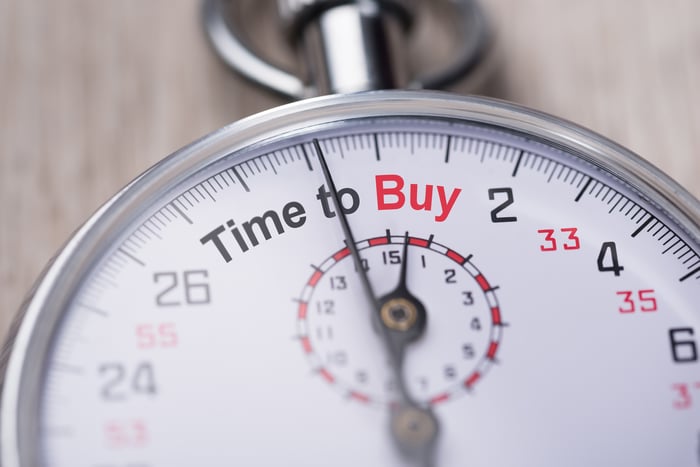On Wall Street, Berkshire Hathaway (BRK.A 1.42%) (BRK.B 1.38%) CEO Warren Buffett is in a class of his own. Since taking the reins in the mid-1960s, he's overseen a greater than 5,700,000% increase in his company's Class A shares (BRK.A) and has watched Berkshire become one of only 10 publicly traded companies to reach the psychologically important $1 trillion market cap plateau.
With the appropriately named "Oracle of Omaha" running circles around the benchmark S&P 500, it's really no surprise that professional and retail investors eagerly await filings that show which stocks Buffett and his top advisors, Todd Combs and Ted Weschler, have been buying and selling.

Berkshire Hathaway CEO Warren Buffett. Image source: The Motley Fool.
Quarterly Form 13F filings with the Securities and Exchange Commission (SEC) usually make it easy to follow in Buffett's footsteps. A 13F is a required filing for institutional investors with at least $100 million in assets under management, which outlines their buying and selling activity from the prior quarter. Berkshire Hathaway's investment portfolio tipped the scales at almost $303 billion, as of the closing bell on Dec. 3.
While 13Fs provide invaluable data and insight, Berkshire Hathaway's 13F fails to tell the full story. There's a stock the Oracle of Omaha has invested almost $78 billion into (at cost) since the midpoint of 2018, but it's not something you'll find listed in Berkshire's 13Fs. However, it's the stock Buffett is likeliest to buy in 2025.
Some of Warren Buffett's core holdings are getting the heave-ho
When Berkshire's chief issued his annual letter to shareholders earlier this year, he alluded to eight companies being "indefinite" holdings. Most investors are probably aware of Coca-Cola and American Express, which have been respective fixtures in Berkshire Hathaway's portfolio since 1988 and 1991. However, Buffett's letter also included Occidental Petroleum and its five Japanese trading houses in the mix.
Curiously, Berkshire Hathaway's two-largest holdings entering 2024, Apple (AAPL -0.48%) and Bank of America (BAC 1.60%), weren't listed in Buffett's latest annual letter as forever holdings -- and the recent trading activity in both stocks demonstrates this.
Over the trailing year (ended Sept. 30), Buffett has sent more than 615 million shares of Apple to the chopping block, which represents a reduction of 67%. Apple is a stock that Buffett had invested well over $30 billion at cost into since the first quarter of 2016. During Berkshire's annual shareholder meeting in May, Buffett suggested that locking in gains with Apple is a way to take advantage of a historically low corporate tax rate.
Meanwhile, Warren Buffett has parted ways with north of 266 million shares of Bank of America (BofA) since July 17, based on available data from Form 4 filings. This type of filing is required when Berkshire buys or sells shares of a public company that it holds at least a 10% stake in. Since Berkshire now holds less than 10% of BofA's outstanding shares, it's no longer required to alert investors via Form 4 every time it sells shares.
Over the last eight quarters, Berkshire Hathaway's brightest minds, led by Buffett, have collectively sold $166.2 billion more in stocks than they've purchased. This looks to be a clear-as-day warning to Wall Street that the stock market is historically pricey and value is becoming tougher to find with each passing quarter.
But there is one stock Warren Buffett is almost certain to buy in 2025, especially with Berkshire Hathaway sitting on an all-time record $325 billion in cash.

Image source: Getty Images.
Buffett has spent almost $78 billion (at cost) buying shares of this stock over six years
While there are a couple of standout value stocks in Berkshire Hathaway's portfolio, a couple of which the Oracle of Omaha and his team have been purchasing of late (e.g., Sirius XM Holdings), the stock Buffett is likeliest to purchase in 2025, which won't be found in Berkshire's 13Fs, is (drum roll) shares of his own company.
Prior to July 2018, Warren Buffett had no means of putting his company's cash to work via buybacks. The rules governing share repurchases required that Berkshire Hathaway's stock trade at or below 120% of book value for buybacks to take place. Unfortunately for Buffett, his company's stock never fell below this threshold.
On July 17, 2018, Berkshire's board amended the buyback criteria to allow its company's chief more freedom to repurchase shares. Under the new rules, buybacks were allowed with no ceiling or end date as long as Berkshire Hathaway had at least $30 billion in combined cash, cash equivalents, and U.S. Treasuries on its balance sheet, and Warren Buffett believes his company's shares are intrinsically cheap. This latter criterion is intentionally vague to give Buffett the freedom to buy back stock at will.
For 24 consecutive quarters since these criteria were amended, Warren Buffett repurchased shares of his company's stock. The cumulative value of these buybacks is close to $78 billion, which is far more than he's spent buying shares of Apple, Bank of America, and Occidental Petroleum on a combined basis.
Interestingly, the September-ended quarter marked the first time since the buyback rules were amended that Warren Buffett didn't green-light any share repurchases. This likely has to do with Berkshire's stock trading for a 60% to 70% premium to its book value, which represents its loftiest price-to-book value in roughly 16 years. As an ardent value investor, Berkshire's chief decided to sit on his hands.
However, having $325.2 billion worth of cash in Berkshire Hathaway's coffers should give the Oracle of Omaha the liberty of being a bit looser with his perception of value -- at least when it comes to shares of his own company. With Buffett repurchasing shares for 24 straight quarters prior to the most recent quarter, it seems only logical that Berkshire Hathaway is the stock he's virtually guaranteed to buy at some point (if not every quarter) in 2025.





